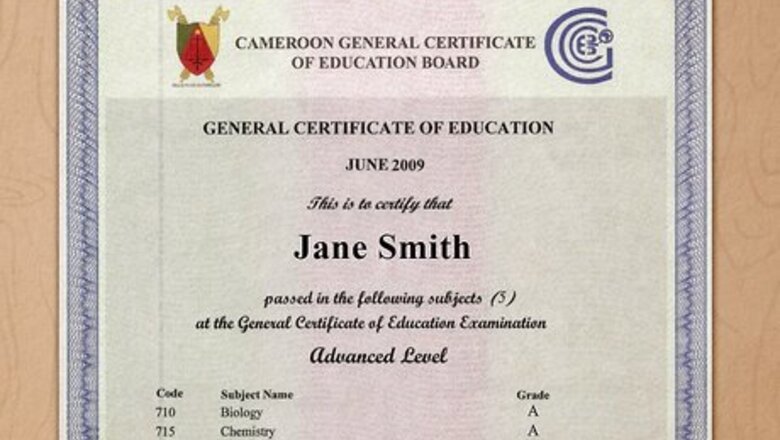
views
Undergraduate Applications

Meet or exceed LSE's academic requirements. LSE's academic standards are rigid. Typically, successful applicants earn A to A* grades on the General Certificate of Education (GCE) A-level or International Baccalaureate Diploma Program (IB). LSE evaluates candidates based on a host of other criteria, so keep in mind excellent grades won't guarantee entry. If you're an international student, LSE provides nation-specific academic requirements.
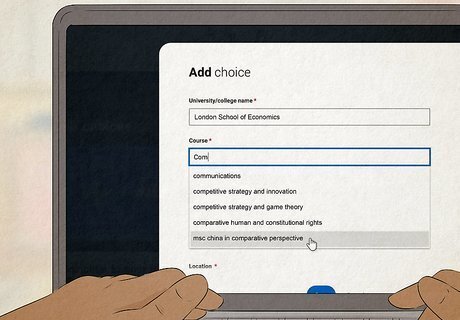
Choose a program of study. When you fill out the UCAS (Universities and College Admissions Service) application, you'll need to enter your intended LSE program. Choose a specialization that motivates you, and take the time to thoroughly research it. In your personal statement, you'll need to explain why you want to enroll in that program at LSE. Your program might have additional application requirements, such as a writing sample. Check your potential program's website for specific requirements. From Economic History to Politics and Philosophy, there are 40 undergraduate programs at LSE. Find a complete list of undergraduate programs here: http://www.lse.ac.uk/Programmes/Search-Courses?query&f.Study+Type%7Ctype=undergraduate.

Craft a personal statement that conveys passion for your program. You'll enter your personal statement into a field on the UCAS application. At least 80% of your statement should focus on your academic interests and why you've chosen your program of study. Be specific, clear, and demonstrate that you are knowledgeable about your field and how your chose program functions. For instance, don't write, “It's always been my dream to study at LSE. I love history, and I've always wanted to become a historian. I especially love ancient Rome.” This example is informal, isn't specific, and LSE doesn't have an ancient history program. A well-crafted personal statement might include statements such as, "My fascination with complex systems laid the foundation for my decision to specialize in modern economic analysis. During my internship with HSBC, I witnessed firsthand how the interaction of myriad variables weaves the fabric of our global economic tapestry."
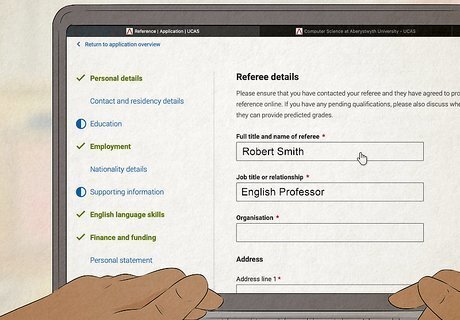
Choose a reference who's familiar with your academic and personal achievements. You'll enter your reference's professional email address on the UCAS application, and they'll be asked to write you a recommendation. Your reference should be a tutor or teacher who knows you academically and personally. Be sure to ask them before you submit their information on UCAS. They'll need to describe your academic achievements and articulate that you are able to surpass LSE's rigorous standards. It's okay to be nervous about asking someone to be your reference. The most important thing is to give your reference plenty of time to draft a recommendation. Ask them at least a month before you submit your application.
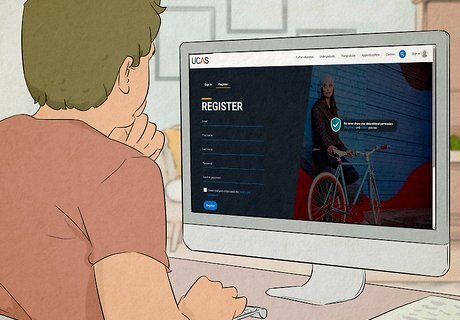
Register with UCAS and submit your application before the deadline. You'll need to enter your personal details, education history, reference, personal statement, and other information on the UCAS application. LSE does not accept undergraduate applications mailed to the school. Avoid waiting until the last minute. Try to submit your application as soon as possible. Register and submit your application here: https://www.ucas.com/ucas/undergraduate/register.

Track your application and wait for a decision. After submitting your application, you can track its status on the UCAS website. You'll be notified of a decision by the UCAS decisions deadline, typically in mid-May of the academic year in which you've applied. Whilst LSE aims to reach and deliver decisions within 12 weeks, don't be disheartened if you don't hear from LSE as early as other universities, the school has a distinct reputation for making decisions late in the admissions cycle. If you don't make it through the initial assessment, you'll receive notice within 2 to 3 weeks.

Take the UGAA, if necessary. Competitive students with unconventional qualifications, such as certain international diplomas, are asked to sit for an Undergraduate Admissions Assessment (UGAA). It's typically used to evaluate students who don't have sufficient standardized test scores. LSE will let you know the location of your closest authorized test center. The test is required for anyone asked to take it. A passing grade doesn't guarantee entry.
Graduate Applications
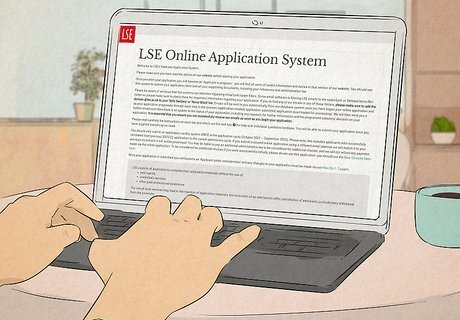
Submit your application and supporting documents on the LSE website. Graduate applications are processed through the graduate studies page on the LSE website. You'll enter your personal information into the application form and upload your supporting documents through the web portal. Register and complete your application here: https://evision.lse.ac.uk/urd/sits.urd/run/siw_ipp_lgn.login?process=siw_ipp_app&code1=ONLINEAPP&code2=2018.
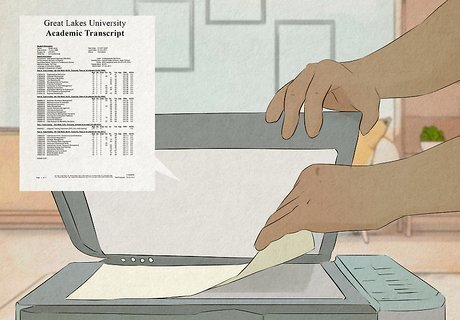
Upload a scanned copy of your official transcript. Get an official copy of your undergraduate transcript from your alma mater. Scan it and upload the digital copy onto the application portal. Standards for undergraduate marks are high. If you studied in the United States, you'll need a GPA between 3.5 and 4.0 out of 4.0.
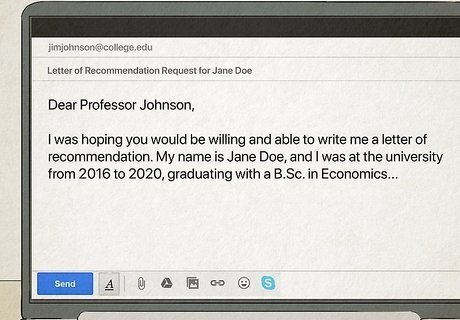
Choose 2 academic references. Your references should be professors who are well-versed in your undergraduate academic performance. Good choices include your thesis chair or academic adviser. Ask them ahead of time, then submit their professional email addresses on the graduate application.
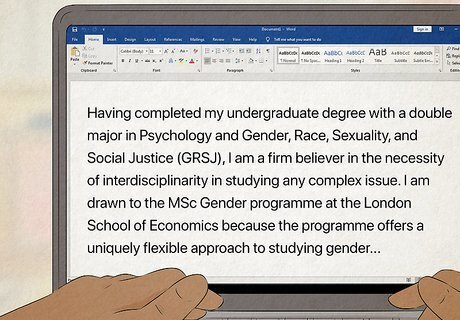
Write a clear, concise, and specific personal statement. Similar to an undergraduate application, your graduate personal statement should focus on your program of study. However, it needs to be even more specific. You need to demonstrate that you have a solid foundation in your chosen field and know exactly what your research will encompass. Find a list of graduate programs here: http://www.lse.ac.uk/study-at-lse/Graduate/Available-programmes.

Summarize your professional experience in a CV. You'll upload a digital copy of your CV on the application portal. A competitive CV (curriculum vitae) includes work history that relates to your program of interest. Relevant internships and other experience can help put you ahead of the game.
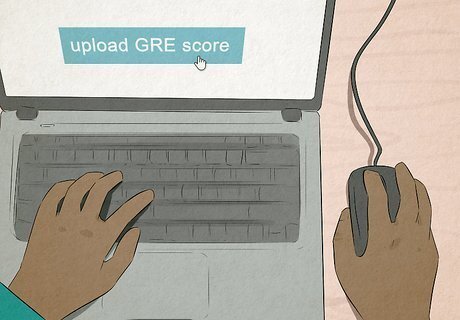
Submit any supporting documents required by your program. Your program might require GRE or GMAT scores, a research proposal, a sample of written work, or other additional documents. Check your chosen program's website for guidelines. You'll still submit any additional documents on the graduate application portal.
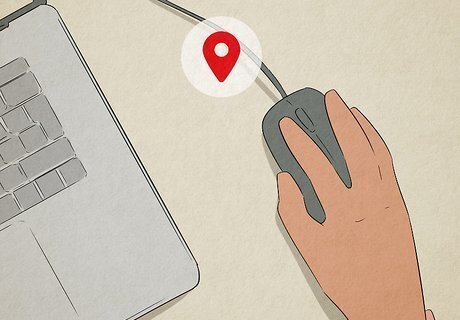
Track your application and wait for a decision. Applications are accepted on a rolling basis, so there's no specific deadline. You'll be able to track your application on the LSE website after submitting it. You should get your decision within 6 months.
International Applications
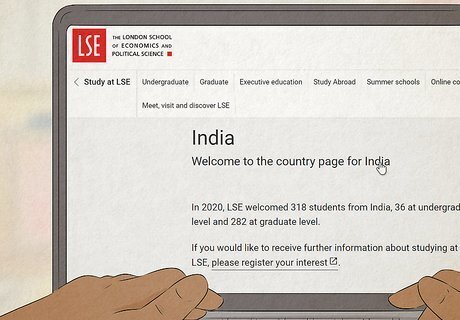
Check LSE's educational requirements for your nation. LSE provides requirements for nations across the globe. Find your nation's required educational qualifications here: http://www.lse.ac.uk/study/informationForInternationalStudents/countryRegion/Home.aspx For example, a United States diploma alone isn't sufficient. You'd need to complete 5 AP courses in order to meet LSE's education requirements.
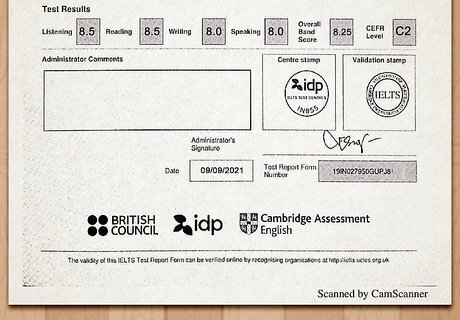
Meet English language requirements. If English isn't your first language, you'll need to demonstrate your English fluency. LSE accepts several qualifications, including the International and European Baccalaureates, GSCE in English, and the TOEFL Test.

Make sure your reference attests to your ability to live abroad. In addition to discussing your academic credentials, your reference must also convey that you can adapt to life in another country. Ask your reference to include this information in their recommendation. Tell your reference about experiences that have prepared you for life abroad, such as trips you've taken by yourself or a summer school program you completed in another country. If English isn't your first language, your reference should also mention your English fluency.
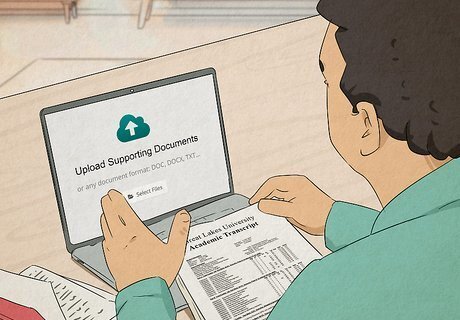
Assemble your UCAS or graduate application. International students complete undergraduate and graduate applications just like UK residents. File an undergraduate application through UCAS, and submit a graduate application through the LSE website. Include all required supporting documents and, if applicable, submit your application before the deadline.

Apply for a Tier 4 Visa upon acceptance. You'll need your acceptance offer to apply for a student visa. File your application on the UK visa website. You'll then book an appointment to submit your application at an authorized visa center.
Standing out from the Crowd

Form relationships with mentors familiar with LSE or your field. Networking can help put you a step ahead of other applicants. Reach out to teachers with expertise in subjects that interest you most. Ask them about career paths, programs of study, and for advice about choosing and applying to universities. For instance, if you're interested in politics, talk to your contemporary history or politics instructor. Tell them you're interested in a career in politics, and ask them about practical applications that involve your interests. If you know anyone who went to LSE, such as a teacher or family friend, pick their brain about the university's culture and application process.

Try to form long-term career goals. You don't have to stress about planning out your entire life when you're still a teenager. However, it helps to have an idea of what you want to do and which programs of study will help you achieve your goals. Reflect on your interests, ask your mentors for advice, and choose career options related to your passions. Suppose you're interested in economics and history, and love volunteering to tutor younger students. You could specialize in economic history or a similar program, pursue graduate studies, and become a college professor.

Research LSE and potential programs as much as possible. Every university has a unique culture, and every admissions department has its own set of standards. Dig deep into LSE's website to learn about life there and what kind of students they accept. Spend as much time as possible reading about LSE programs of study, which each have a website packed with information. You'll apply to a specific program at LSE, and you'll need to demonstrate your knowledge of that program in your personal statement. The more you research that program, the better your chance of creating a competitive personal statement.

Participate in activities that relate your academic interests. Extracurricular activities can make you a more rounded applicant. LSE prioritizes activities that help hone skills relevant to your intended program of study or long-term career goals. Leadership roles, such as the president of a club or student government, can also help give you an edge over other candidates. If you're interested in international relations, model UN would be a great activity. A future business leaders club, math club, debate team, and tutoring other students are all activities that look great on applications.



















Comments
0 comment